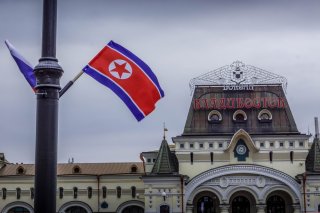The Third Russia-North Korea Summit: Symbolic or Substantive?
President Vladimir Putin and Supreme Leader Kim Jong-un’s latest face-to-face did not yield a concrete outcome. But that doesn’t mean it wasn’t important.
Last month’s meeting between North Korean supreme leader Kim Jong-un and Russian president Vladimir Putin demonstrated that Russia and North Korea have always maintained a stable and positive relationship, which could most likely evolve into a tighter one.
While not intimate, the two countries have long shared a common interest in challenging—in practice and symbolically—the U.S.-led order and U.S. interests in their distinct ways: Russia, by invading Ukraine, and North Korea, by advancing their nuclear weapons and missile delivery capabilities.
This mutual interest has manifested through leader-to-leader consultations. Kim and Putin had their first summit in April 2019 following the collapse of US-North Korea talks in Hanoi to discuss denuclearization. They met for the second time last month, which added weight to possible military cooperation and technology transfer.
Other diplomatic invitations and hosting, such as Kim’s invitation to Chinese and Russian delegations to North Korea’s seventy-fifth founding anniversary, attest to their mutual interests in performing a symbolic joint resistance against U.S. interests.
That Russia and North Korea share a steadfast bond is also instantiated by their willingness to be public about their leader-level meetings. Taking advantage of the publicness, Moscow demonstrated the strength of its relations with Pyongyang by showcasing its generosity in accommodating Kim’s preference for rail travel.
For both meetings, it chose Vladivostok over Moscow as the venue, deviating from the diplomatic norm of holding leader-level visits in the capital of the receiving state. At last month’s summit, Putin offered Kim a lavish treatment.
Some may dismiss the 2023 summit as it did not produce any joint statement, but not all meetings must be accompanied by an outcome or tangible deliverables.
At times, it matters that leaders meet at all, as face-to-face diplomacy offers a productive channel for leaders to share their views frankly. Under the right political circumstances and willingness, momentum can set in for subsequent meetings at either the highest or working levels, culminating in significant agreements or deeper relations.
In this sense, the September summit was productive, as Putin accepted Kim’s invitation to Pyongyang. Putin’s reciprocal visit could be taking place in the near future, as suggested by Russian Foreign Minister Sergei Lavrov’s meeting with Kim yesterday in Pyongyang, likely following up on last month’s summit.
Regardless of the third Kim-Putin summit, the impression they generated is more important than whether the talks were substantive. From North Korea’s and Russia’s perspectives, the summit was meaningful and even successful. Despite the absence of a joint statement, it caught the world’s attention and left a strong impression that their relationship could transform into something more substantial than symbolic bonding for the time being.
Minseon Ku is a Rosenwald Postdoctoral Fellow in U.S. Foreign Policy and International Security at the John Sloan Dickey Center for International Understanding at Dartmouth College.
Image: Shutterstock.

